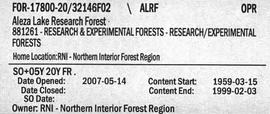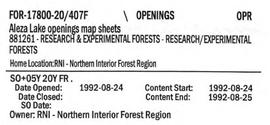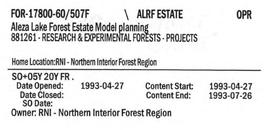File contains road reconstruction project reports, photocopies of invoices and work orders, records of daily costs, photocopies of hired equipment daily time reports, related correspondence, and maps.
File contains official government reports on tree types, correspondence regarding research proposals, and working plans.
File contains typed file notes and charts of remeasured experimental plots, as well as a floppy disk
File contains research project reports and charts of remeasured permanent sample plots.
File contains handwritten journal lists of remeasured permanent sample plots and charts of remeasured permanent sample plots.
File contains charts consisting of the remeasurements of the basal area and cut stump data in permanent sample plots.
Maps reflect reserve boundary, roads, trails, 20 feet contour intervals, air photo centre, declination, swamps, and mile post.
File contains various documents pertaining to the history of the Aleza Lake Experiment Station, correspondence regarding various administrative issues and research projects ranging from 1972 to 1996, field notes, 1996 meeting minutes, memoranda containing details on the management and preservation of the Aleza Lake Research Forest, various reports on research projects, 1987 permits, field notes, a 1970 working plan, and 6 colour photographs of the Aleza Lake Garbage Dump.
File contains plot summaries of selected permanent sample plots, correspondence regarding field courses, records of management committee meetings from 1991 and 1990, documents and correspondence pertaining to the re-opening of the Aleza Lake Research Forest, partial cutting summaries, research proposals and studies, cost and revenues documents, a 1961 biography on Percy Barr, charts covering remeasurements of permanent sample plots, hand written correspondence from 1990 discussing the history of marking crews, and a brief history of the Aleza Lake Experiment Station.
File contains trail guide brochures, a 1931 original copy of the Aleza Lake Experiment Station statement of its purpose and development, and other forest related brochures and books.
File contains a trail guide, a report on potential trail building, and related maps.
File contains an original informational brochure on ecological reserves in British Columbia and correspondence relating to the transfer of the Aleza Lake Research Forest to a university research forest.
File consists of correspondence between Michael Jull, Research Silviculturist, and potential contractors, regarding proposals for the 1993 and 1994 remeasurement of Aleza Lake Growth and Yield Permanent Sample Plots.
File contains original and photocopied drafts of working plans and drafts, planning projects, original amendments to special use permits, handwritten notes, related correspondence, and photocopied maps.
File contains a brochure, a 1993 solid waste management plan, a 1996 Forest Practices policy handbook, and a 1996 draft of the Prince George Land and Resource Management Plan.
File contains drafts of management and working plan for the period of 1992 to 2002, the final draft for the management and working plan, and related correspondence between Mike Jull and those involved with the Aleza Lake Research Forest.
File contains two different working and management plans for 1992 to 2002 as submitted by the Aleza Lake Steering Committee.
File contains proposals and recommendations, and first and final drafts of 5 year working and management plans for 1991.
File contains original copy of the 1957 - 1967 working plan for the Aleza Lake Research Forest.
File contains working plans from 1957, photographic records, and forecasted revenue records.
File contains a preliminary working plan from 1950.
File contains information, including diagrams, measurement charts, and a map, for experimental plot 50.
File contains information, including diagrams, measurement charts, and a map, for experimental plot 45.
File contains information, including diagrams, measurement charts, and a map, for experimental plot 292.
File contains information, including diagrams, measurement charts, and a map, for experimental plot 291.
File contains information, including measurement charts and a map, from experimental plot 150.
File contains information, including diagrams, measurement charts, and a map, for experimental plot 119.
File contains information, including diagrams, measurement charts, and a map, for experimental plot 118.
File contains information, including diagrams, measurement charts, and a map, for experimental plot 117.
File contains information, including diagrams, measurement charts, and a map, for experimental plot 116.
File contains information, including diagrams, measurement charts, and a map, for experimental plot 115.
File contains information, including diagrams, measurement charts, and a map, for experimental plot 103.
File contains information, including diagrams, measurement charts, and a map, for experimental plot 113.
File contains information, including diagrams, measurement charts, and a map, for experimental plot 112.
File contains information, including diagrams, measurement charts, and a map, for experimental plot 107.
File contains information, including diagrams, measurement charts, and a map, for experimental plot 106.
File contains information, including diagrams, measurement charts, and a map, for experimental plot 149.
File contains information, including diagrams, measurement charts, and a map, for experimental plot 148.
File contains slides and photos pertaining to the history of the Aleza Lake Experiment Station and the community.
File contains the 1929 Aleza Lake guestbook, a report on seeding, and photographs.
File contains map sheets with information relating to the historical recording of information concerning silvicultural treatments carried out on specific areas of land. This includes records concerning changes in the forest cover, changes in prescriptions, cut boundaries, changes in site prescriptions, original copies of silviculture prescriptions, and site plans.
File contains overview diagrams of Northwood cutting permits inside the Aleza Lake Research Forest, cutblocks showing harvesting and silvicultural history, detailed activity reports by cutblock, and 1992 Northwood cost summaries.
File contains datelines, small maps consisting of ecological site types, handwritten notes, overheads, terrain resource management information digital map data, and trail system maps.
File contains correspondence regarding Estate Modelling plans for the Aleza Lake Research Forest and handwritten notes from meetings.
File consists of:
- "A Summary of Historical Orders-in-Council affecting the Aleza Lake Forest Reserve", Mike Jull, 18 Dec. 1996
- Photocopied memorandum from F.S. McKinnon regarding "Transfer of Aleza Lake to D.F. Prince George", 9 Sept. 1963
- Photocopied 1928 article by P.M. Barr from Forestry Chronicle 4(3) entitled "The Aleza Lake Experiment Station: Its Development and Purpose"
- "A Brief History of the Aleza Lake Experiment Station", [Tim Decie, 1981?]
- Contact information for living relatives of Percy Barr, as of 1990
- Photocopy of 1930 article by Percy Barr entitled "Spruce Reproduction in British Columbia"
- Photocopy of records from BC Archives from a visit by Harry Coates from the file GR 1348 "The Young Mens Forestry Training Program"
- Photocopy of excerpt regarding "Amanita Lake/Diameter Limit Logging"
- Various small-scale maps and charts regarding Aleza Lake
- "Aleza Lake Research Forest Information Session Notes with Mike Jull, Manager of ALRF"
File consists of working copies of aerial photos, vegetation tables printed from computer disk, photocopies of plot sheets, and lists identifying species.
File contains Aleza Lake Experiment Station Climate Station data from 1952 to 1980 and three accompanying floppies with weather data and Fortran programs.
File consists of a speech given by Gary Runka entitled "Agriculture in the Urban Shadow" at the Agricultural Land Commission Symposium - Urban Growth and the Agricultural Land Reserve: 'Up not Out' - March 9,1993.
Commentary on this speech by Barry Smith of the Ministry of Agriculture and Lands:
"This represents an important, highly pertinent speech concerning farmland preservation in B.C. The speech was given at the ALC Symposium marking the 20th anniversary of B.C.'s farmland preservation program. The speech rings as relevant today as it did when delivered 22 years ago.
It begins by identifying two perspectives - one, those committed to an agricultural future, contributing diversity and having a social value and two, those that feel agriculture is ultimately doomed and is only an interim use, especially in the urban shadow, until a "higher and better" use comes along. GGR states that we need to honestly state which perspective we are guided by.
There are a host of important themes woven through this paper including:
- While farming on the urban shadow benefits both the urban and farm communities, the negative impacts of urban/farm adjacency are predominantly borne by the agricultural community.
- In describing the situation prior to the farmland preservation legislation in the 1960's and early 1970's agriculture was consistently the "loser user".
- Even in the earliest days of the Commission, urban shadow issues were identified and the ALC recognized that provincial zoning was only a first step, and taken alone, was not enough.
- The BC farmland preservation program has been at least as successful as anywhere else in North American and looked on with envy in many other jurisdictions.
- GGR believes that after 20 years we are worse off today than when the program started due to (i) elected provincial politicians involved with the application process (ii) the ALR / Golf Course fiasco and (ill) the ALC has become paralyzed in their Appeal Board mode.
Several (13 starting on p. 7) urban shadow issues are outlined and GGR states that we must be serious about addressing urban shadow issues.
The paper ends with an outline of "where we need to be tomorrow" and GGR states: "I recall when the program began in 1973 we argued that all of the compromises with respect to agriculture had already been made, if we were to keep the options open for future
generations In British Columbia. If that statement was true then, how much more true is it today, 20 years later?"
From the Symposium concluding remarks, Gary Runka stated that based on his experience and discussions during the symposium, he believed that the following initiatives should be given priority:
- Information and education programs
- Communication between farmers, government and the public
- Regional land use planning
- Integration of government policies to a strong farmland preservation strategy
- Provincial agricultural strategy
- Programs which insure farms can be viable
The Symposium proceedings have been compiled in a 67 page ALC publication."
File consists of a speech given by Gary Runka to the B.C.I.A. entitled "Agricultural Land Reserves and the Land Commission Act".
Commentary on this speech by Barry Smith of the Ministry of Agriculture and Lands:
"With the original package associated with this speech are 5 pages of rough notes for another speech with the same title prepared for a B.C.I.A. meeting on March 22, 1976... Given that these rough notes were held with the material associated with the April 15, 1976 meeting it is possible the B.C.I.A. meeting planned for March was shifted to the April date. Additionally there are 6 pages numbered 6-11 that are of some detail concerning the work of the Commission but appear to be part of another speech but are included with the B.C.I.A. package and have, therefore, been [included with this speech].
The title of the speech "Agricultural Land Reserves and the Land Commission Act" sums up the thrust of the speech which notes the objectives of the legislation, the Commission's program of land acquisition and Commission research and support of innovative projects to assist rural planning to create a positive environment for agriculture and give direction to urban growth away from farmland.
Additionally an overview is provided of the Commission's activities in its first two years of operation. GGR comments that establishing the ALRs "... was but a first step and we feel that it is our job to continue to protect the Reserve by whatever approaches and methods of rural planning that are available to us". This speaks to a Commission that saw its role, even at this early stage, as being much more than simply a rationing board reviewing ALR applications.
Several examples are outlined in which it is suggested that professional agrologists should be looking at carefully.
At the end of the speech (p.5) GGR includes (a note to himself) to "follow with example of an agrologist's public statement" that obviously was of concern. The actual public statement was not included with the speech given on April 15th but was included in the rough notes of the speech dated March 22 which read as follows:
"Yet a member of the B.C.I.A. - a P.Ag - is quoted in the press in response to a local politician who asked him a question something like this in regard to an ALR exclusion application:
Local politician: What about the international, national and local concerns regarding land for future food production?
BOA member P.Ag: We should firstly be concerned with places for people to live and secondly worry about land for food production.
This is our profession - the image is yours to make.
I don't mean that we should go overboard, but if we are not willing to defend preservation of agricultural land - who is?"
File consists of a speech given by Gary Runka entitled "Agricultural Land Preservation - Some of the Problems" to an unknown audience, possibly a political caucus. A "Process Chart" of the B.C. Agricultural Land Commission Act is attached to the speech.
Commentary on this speech by Barry Smith of the Ministry of Agriculture and Lands:
"This speech was given several months after GGR's resignation as Chair of the Commission in January, 1979. There is no specific indication of who the speech was given to but mention is made to "caucus members" (p. 4) and therefore may have been the NDP caucus.
Specific mention is made to the opportunity to undermine the program by the Section 9(8) changes to the Act. (This is a reference to allowing the Minister of Agriculture to forward appeals of Commission's decisions to the Environment and Land Use Committee of Cabinet if no two Commissioners give leave to appeal)..
Mention is also made to the need for the Commission to be aware of problems affecting agriculture if it is to be the true defender of agricultural interests. Reference (p. 3) is made to the Commission being: "... too busy attending to applications to take a seriously positive role to ensure that present and future land use conflicts ... are minimized."
GGR also raises his concern with attempts to narrow the definition of "agricultural land" by suggestions that CLI Class 4 - 7 lands be automatically excluded from the ALR. He also expresses the need to be concerned with land use planning outside the ALR.
GGR criticizes "a less than positive attitude by government" (to farmland preservation) and calls for the need for a provincial land use strategy."


